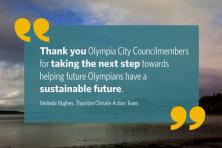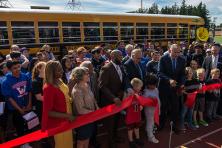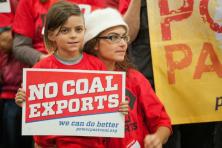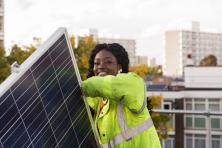What an opportunity we have in the Pacific Northwest. The national Clean and Fair Economy Summit is happening later this week right here in Washington State. This conference will bring together the blue and the green – labor and environmentalists – to forge a better future together: A future that ushers in the clean energy revolution we need, where we stand up tall and confront the twin crises of climate disruption and economic inequality. It’s a future of economic security and shared, sustainable prosperity.
With disasters unfolding now in Houston and Florida, 1,200 people killed in floods in India and other countries in South Asia, and the wildfires with their smoky haze now common place in the Pacific Northwest, the time is now to solve the climate crisis. It’s time to move swiftly toward clean energy and commit to transitioning to 100% clean energy in the years to come.
At the same time, the transition to a clean energy future has real consequences for coal and other fossil fuel-dependent communities. Both my grandfathers were coal miners, so I know first-hand how much families rely on the coal industry to support their families. I also just spent some time with legislators from Wyoming, where the coal industry employs their people and helps provide the money to build schools. It is essential that we utilize strategies to ensure goods jobs as we make the transition to a low carbon economy. Our shared prosperity depends on it.
Nationwide, jobs in clean energy like solar and wind are more abundant than jobs in the coal sector. But for states like Wyoming, where 3% of the workforce is employed in the coal industry, families are and will continue to be impacted through this transition. As we make the transition, our policies and actions must build in programs to help families stay strong and ensure that workers find economic security in a changing energy future.
Opportunities abound for shared prosperity in a clean energy world. We can invest in creating the infrastructure that makes our communities more resilient – like ensuring our communities can access clean and abundant water, have clean and affordable transportation options, and have jobs opportunities in the clean energy sector.
Many cities and towns around the country are struggling with clean water, while as a country we waste trillions of gallons each year. As our climate changes, it becomes even more important to build up resilient water systems, creating jobs that will help us reduce wasted water, adapt to changing precipitation patterns, and manage stormwater.
A lack of transit and safe places to walk and bike are plaguing cities around our nation, leaving people stuck in traffic and unnecessarily polluting our air. Smart investments in transportation and transit systems can get people where they need to go, while also improving health, increasing access to jobs - particularly in low income communities, and reducing climate pollution. These investments create quality jobs in the construction and manufacturing sectors.
Every day, union workers are fighting climate change just by doing their jobs, from fixing leaking water pipes to manufacturing the next generation of clean vehicle technology to installing solar arrays. Yet much more needs to be done to ensure that the jobs created in the emerging clean economy are union jobs—ensuring safe workplaces, better wages, and a secure retirement.
At the Clean and Fair Energy Summit, the blues and the greens are getting to work to solve these issues together.





